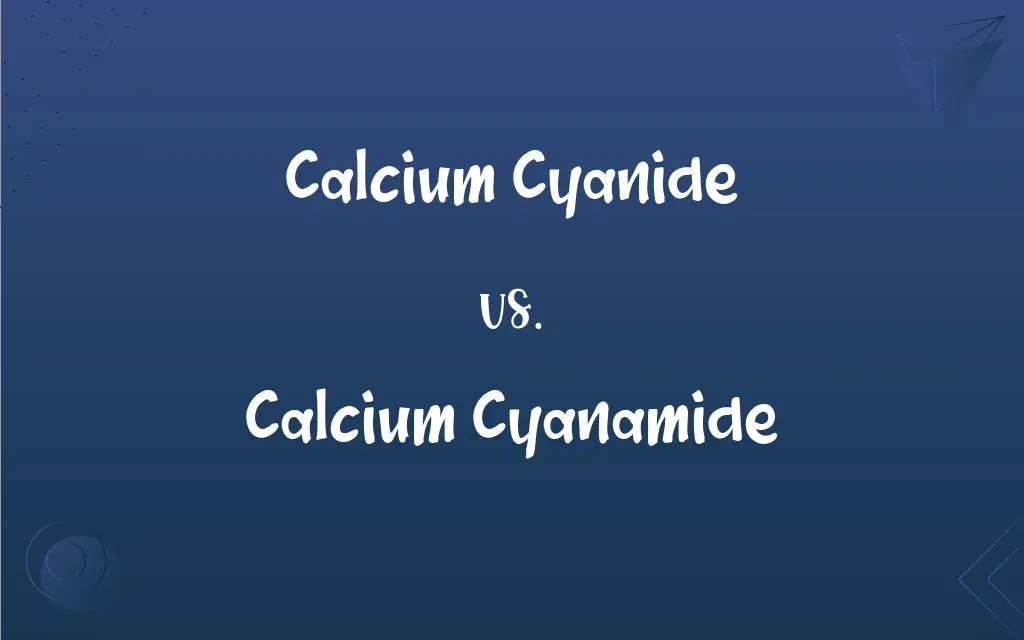Calcium Cyanide vs. Calcium Cyanamide: What's the Difference?
Edited by Harlon Moss || By Janet White || Published on December 26, 2023
Calcium cyanide, a toxic compound, releases hydrogen cyanide upon contact with water, while calcium cyanamide, a fertilizer, slowly releases nitrogen to soil.

Key Differences
Calcium cyanide, chemically Ca(CN)₂, is highly toxic and used primarily in pest control. Calcium cyanamide, CaCN₂, serves as a nitrogen-rich fertilizer beneficial for plant growth.
When exposed to water, calcium cyanide releases hydrogen cyanide gas, a potent and dangerous toxin. In contrast, calcium cyanamide decomposes in soil to release ammonia and cyanamide, aiding in nitrogen enrichment without hazardous gas release.
The use of calcium cyanide is strictly regulated due to its toxicity, especially in closed environments. Calcium cyanamide, however, is widely used in agriculture for its effectiveness in soil conditioning and pest control.
Calcium cyanide's primary application is in mining for gold and silver extraction. Calcium cyanamide, on the other hand, is used to promote soil fertility and as a weed killer.
Handling calcium cyanide requires stringent safety measures to prevent exposure and environmental contamination. Calcium cyanamide is safer to handle, though it still requires careful application in agricultural settings.
ADVERTISEMENT
Comparison Chart
Chemical Formula
Ca(CN)₂
CaCN₂
Primary Use
Pest control, gold mining
Fertilizer, soil conditioning
Toxicity
Highly toxic, releases hydrogen cyanide
Less toxic, decomposes to ammonia and cyanamide
Application in Industry
Mining and pest control
Agriculture
Environmental Impact
Dangerous, strict regulations for use and disposal
Safer, used in soil enrichment
ADVERTISEMENT
Calcium Cyanide and Calcium Cyanamide Definitions
Calcium Cyanide
A highly toxic chemical compound used in mining and pest control.
Calcium cyanide is crucial in extracting gold from its ores.
Calcium Cyanamide
Safer than calcium cyanide in environmental impact.
Calcium cyanamide is preferred for its lower toxicity in agricultural applications.
Calcium Cyanide
It reacts with water to release hydrogen cyanide.
Proper handling of calcium cyanide is essential to avoid toxic gas release.
Calcium Cyanamide
A nitrogen-rich fertilizer used in agriculture.
Calcium cyanamide is widely used to enhance soil fertility.
Calcium Cyanide
Known for its effectiveness in rodent control.
Calcium cyanide is used in controlled settings for pest eradication.
Calcium Cyanamide
Used for soil conditioning and as a weed killer.
Farmers use calcium cyanamide to control weeds in their fields.
Calcium Cyanide
Requires strict safety measures during handling.
The storage of calcium cyanide is regulated to prevent environmental hazards.
Calcium Cyanamide
Decomposes in soil to release ammonia and cyanamide.
The application of calcium cyanamide improves nitrogen content in the soil.
Calcium Cyanide
Commonly used in gold and silver mining processes.
The mining industry relies on calcium cyanide for efficient metal extraction.
Calcium Cyanamide
Requires careful handling in agricultural settings.
Even though it's safer, proper application of calcium cyanamide is important.
Calcium Cyanamide
A compound used as a fertilizer and as a source of nitrogen compounds
FAQs
Can calcium cyanide be used in agriculture?
Due to its high toxicity, its use is generally avoided in agriculture.
How toxic is calcium cyanide?
Calcium cyanide is highly toxic, especially when it releases hydrogen cyanide gas upon contact with water.
What is calcium cyanide used for?
It's used in pest control and metal mining, especially for gold extraction.
What is the main use of calcium cyanamide?
It's primarily used as a nitrogen-rich fertilizer in agriculture.
How is calcium cyanide stored?
It requires secure, dry storage to prevent accidental water contact and gas release.
How does calcium cyanamide affect plant growth?
It promotes plant growth by providing essential nitrogen to the soil.
Why is calcium cyanide regulated?
Its potential to release lethal hydrogen cyanide gas and environmental impact necessitates strict regulation.
Can calcium cyanamide improve soil health?
Yes, it can improve soil health by increasing nitrogen content and aiding in pest control.
What precautions are needed when handling calcium cyanide?
Protective gear and strict adherence to safety guidelines are essential.
Is calcium cyanamide harmful?
While less toxic than calcium cyanide, it still requires careful handling due to its chemical properties.
Is calcium cyanamide environmentally friendly?
It is considered safer for the environment compared to calcium cyanide, particularly in agricultural use.
What happens when calcium cyanamide is added to soil?
It decomposes to release ammonia and cyanamide, enriching the soil with nitrogen.
Are there alternatives to calcium cyanide in mining?
Safer alternatives like sodium cyanide are often used, though calcium cyanide remains in use due to its effectiveness.
Is calcium cyanamide used for weed control?
Yes, it's used as a weed killer and soil conditioner in agriculture.
How does the cost of calcium cyanide compare to calcium cyanamide?
The cost varies based on application and regional availability, with cyanamide typically being more affordable for agricultural use.
What are the environmental risks of calcium cyanide?
It poses significant risks to water sources and wildlife due to its toxicity.
Does calcium cyanamide require special equipment for application?
Standard agricultural equipment is typically sufficient, but protective gear is recommended.
Is there a risk of soil contamination with calcium cyanide?
Yes, improper use can lead to soil and water contamination.
Can calcium cyanide be used in residential settings?
Due to its high toxicity, it is not recommended for residential use.
Can calcium cyanamide be used in organic farming?
Its use in organic farming depends on regional regulations and standards.
About Author
Written by
Janet WhiteJanet White has been an esteemed writer and blogger for Difference Wiki. Holding a Master's degree in Science and Medical Journalism from the prestigious Boston University, she has consistently demonstrated her expertise and passion for her field. When she's not immersed in her work, Janet relishes her time exercising, delving into a good book, and cherishing moments with friends and family.
Edited by
Harlon MossHarlon is a seasoned quality moderator and accomplished content writer for Difference Wiki. An alumnus of the prestigious University of California, he earned his degree in Computer Science. Leveraging his academic background, Harlon brings a meticulous and informed perspective to his work, ensuring content accuracy and excellence.






































































